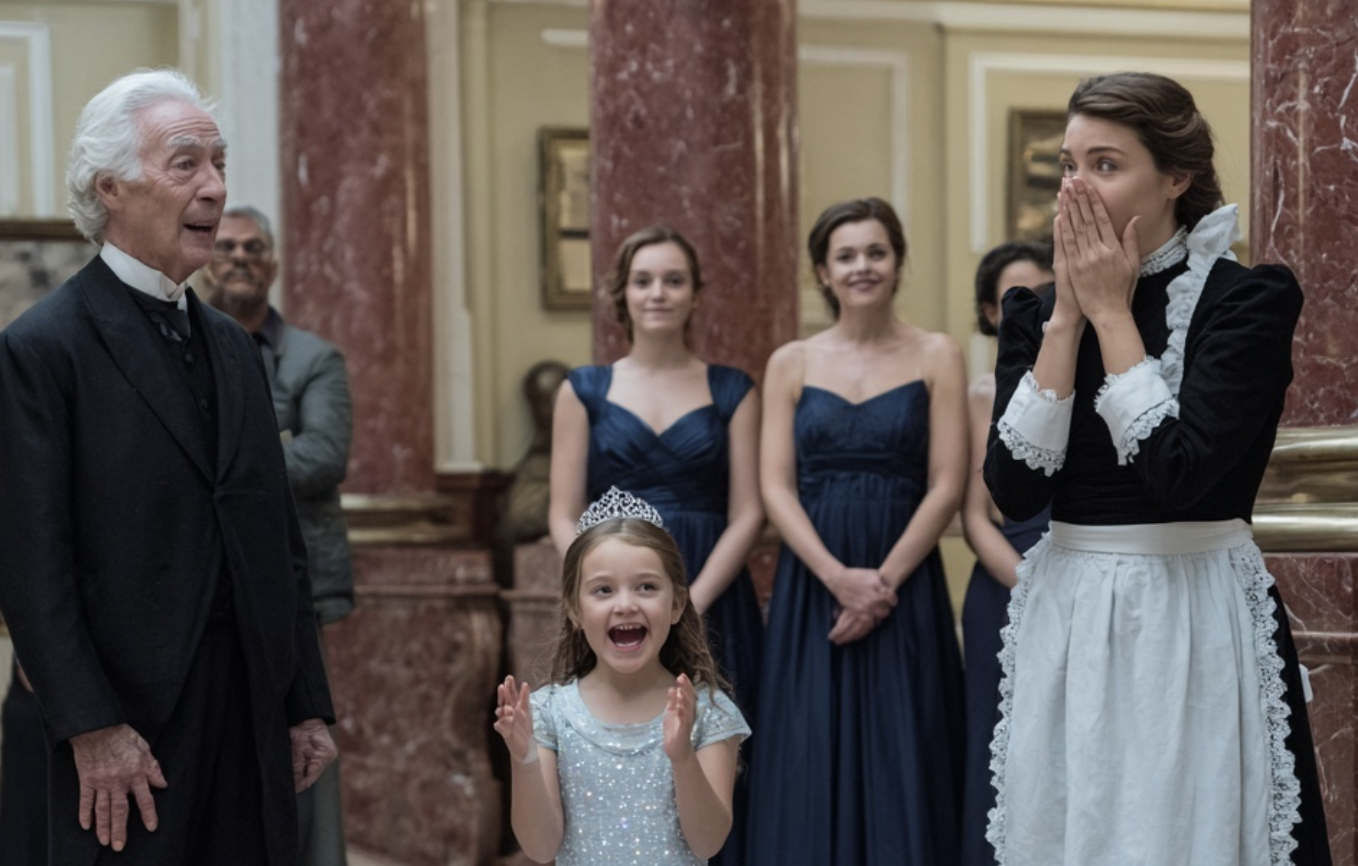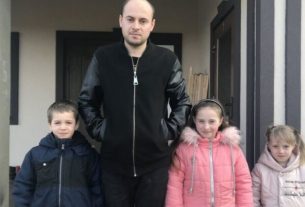“She’s My Mom.”
The chandeliers threw constellations across the marble, a galaxy stitched together by money. Richard Caldwell—real-estate emperor, widower, and man who solved problems with wire transfers—had turned his ballroom into a catwalk. Twelve models flown in from Paris, Milan, New York stood like jeweled chess pieces, gowns whispering when they breathed.
It was, in Richard’s mind, a grand gesture. A solution. Let his eight-year-old daughter, Emily, choose a mother the way other children chose birthday cakes. Beauty, pedigree, poise—surely love could be engineered from those ingredients.
Cameras from his PR team hovered at the edges, lenses blinking. Richard lifted a microphone and polished his smile. “Princess, today you get to pick someone wonderful to be your new mom,” he said, each syllable weighed for maximum charm. “They’re smart, kind, and very excited to meet you.”
Emily did not look at the dresses. Or the hair. Or the diamonds. Her small shoes clicked through the hush as she walked past the line, eyes fixed on the far corner where a woman in a simple uniform stood very still, balancing a tray of water like it was the most important job in the world.
Maria Alvarez—housekeeper, cook, finder of lost stuffed animals, guardian of bedtime—stared back, startled.
Emily stopped, lifted her chin, and pointed. “Daddy,” she said, voice bright and ringing in the cavernous room, “I choose her. She’s my mom.”
Breath left the room. Fans stilled. A model’s smile flickered. Someone whispered, “The maid?”
Richard’s practiced composure cracked. “Sweetheart,” he said lightly, “these ladies came a long way. Perhaps we—”
“No.” Emily slid her hand into Maria’s. “She makes my pancakes like Mommy did. She tells me stories when I can’t sleep. When I cry, she doesn’t leave.”
Maria’s fingers trembled around the tray. She tried to free her hand; Emily only held tighter.
II. The Aftershock
The PR manager went paper-white. The cameras, however, obeyed no one; guests were already filming. In minutes, the moment became a headline: Billionaire’s Daughter Rejects Models, Picks Maid.
Richard called an abrupt intermission. The models regrouped, faces gracious and glassy. A few gathered their clutches and dignity and drifted toward the exits. The guests devoured the scandal in low, delighted voices.
Upstairs, Maria folded clothes with the careful economy of someone who had never assumed permanence. When Emily found her in the small room off the laundry, the girl dissolved. “You can’t go,” she pleaded. “You’re my mom even if Daddy doesn’t know it.”
Maria wrapped her in steady arms. “Mi cielo, I love you. But this is your father’s house. His decision.”
In the doorway, unseen, Richard listened—every matter-of-fact word a stone in his gut.
III. The Kitchen Conversation
Morning brought reporters to the gate like gulls after a storm. Richard cleared his calendar and walked to the one room in the house he rarely entered at that hour. Maria sat at the table, uniform crisp, eyes wary.
Emily hovered in the doorway, chewing her lip.
“I need the truth,” Richard said, each word scraped clean. “Why does my daughter choose you over everyone—even me?”
Maria held his gaze. “Because I was there,” she said simply. “When she woke from nightmares, I sat on the floor by her bed until she slept. When she asked if her mother could hear her, I told her yes and listened to every word. You were grieving, sir. You worked. I don’t blame you. But she didn’t need perfection. She needed a person.”
The knife in Richard’s chest twisted. He had tried to purchase a feeling.
He looked—really looked—at the woman who had knotted his household back together with soft hands and a strict bedtime. Not “the help.” Maria.
IV. Owning It
By noon, the story had grown teeth: Fairytale Pageant Backfires, Little Girl Topples Billionaire’s Plan. Late that afternoon, Richard stepped in front of the cameras and did something unfamiliar. He told the truth.
“My daughter reminded me that love isn’t something you audition,” he said. “Maria is part of our family. I am grateful to her.”
There was snickering online, as there always is. There was also a wave of applause he had not expected.
Behind the scenes, he found Maria by the back staircase. “I’m sorry,” he said, the words stiff with disuse. “I should have seen it. Emily needs you. If you’re willing, I’d like you to stay—and not as someone we introduce by your job title.”
Maria studied him for a long moment. “Emily comes first,” she said.
“She always will,” he replied.
V. What Love Looks Like
The scandal burned hot and brief; the internet moved on. Inside the Caldwell home, something steadier took shape.
Richard learned the weight of a storybook at 8:15 p.m. and the recipe for imperfect pancakes on Saturday mornings. He started coming home before dark, sometimes sitting on the floor with his laptop while Emily colored and Maria hummed over a pot on the stove. When people visited, he said, “This is Maria,” and let the sentence stand, complete.
At the next charity gala, there were no imported faces arranged in a line, only a small girl in a blue dress tugging two hands—one large, one calloused—toward the dessert table. Flashbulbs popped anyway. The picture that traveled furthest was not glamorous: it was Emily, frosting on her nose, sandwiched between the father learning and the woman who had never stopped showing up.
Emily’s pronouncement in a glittering room had humiliated a billionaire, punctured a vanity project, and fed a thousand gossip columns. More importantly, it reset a family.
In a world that prizes the performative, an eight-year-old pointed to the quiet center of the house and named it: love.



